#glacial runoff
Text

FORBIDDEN TO REBLOG IN NSFW, 18+ (Porno, Naked/Erotic), AND also not in TRASH BLOGS, racism, politic, guns/wars blogs, thanks. And thanks for your likes!
A tiered plunge waterfall immediately west of the Baker lake Dam in the North Cascades above Concrete, WA. It has no name and since I photographed it named it Baker Lake Falls. At apx 150' tall this is a significant waterfall in the area. Amazingly sacked long exposure that didn't impart vibration into the image.
#colors#water#waterfall#flowing#down#mineral#Baker Lake#Baker Falls#tiered#plunge#river#mineral water#glacial runoff#glacier#cliff#dam#North#Cascades#Washington State
18 notes
·
View notes
Text
OUTSIDE by Brandon Sanderson

Snow is falling. So I look up.
The world mystifies when you stare up through falling snow. Even standing still, you can soar. Even alone, you are surrounded. Even mundane, you find magic. I’ve spent my life chasing the fantastical, yet everything I’ve ever imagined can be casually matched by someone tilting their head up. The soft. Settling. Aspiration.
Of snow on an otherwise ordinary day.
When I was eighteen, I moved from Nebraska to Utah. Here, snow is fleeting, embarrassed to be an obstruction. But in Nebraska, snow squats. It claims land, builds empires. You fight it all winter, carving pathways, reconquering your sidewalks. The cold digs inside, frosting your bones with a chill that lingers, even after you return to warmth.
I often think of those snowy days, now that I live in a desert. But each year my memories are a little less fresh. We build our lives with layer upon layers of years, like falling snow. And like the new snow, most experiences melt away. In interviews, I’ve been asked to recount my most frightening experience. I struggle to answer because it’s the lost memories that scare me—the unnerving knowledge that I’ve forgotten the majority of moments that made me who I am. Those dribbled away when I wasn’t looking and joined the spring runoff of life.
Fortunately, some experiences do remain. In one, I’m fourteen, and it’s a cold night in Nebraska. My best friend at the time was a boy we’ll call John. Though we went to different schools, he was one of the only other Mormon kids around, so our parents often had us play together. When you’re very young, it’s proximity—not shared interests—that makes friends. This often changes as you age. By fourteen, John had found his way to basketball, parties, and popularity. I had not.
On that day, after a youth activity, another friend suggested we leave to go have some fun. I don’t remember where. Strange, that I’ve lost what this was about, though the rest of the scene is etched into the glacial part of my brain. One of us was old enough to drive, so we headed out to their car.
Five seats. Six teens. They’d already counted.
Without a word to me, the others climbed in. John gave me one hesitant look, then settled into the front passenger seat and closed the door. They left me on the curb. The car vanished, taillights flaring in the night like lit cigarettes.
The memory settled in for the long winter. That night. Watching. Remembering John’s face, which was so strikingly conflicted. Half ashamed. Half resigned.
I was no stranger to being outside. It happens when you’re one of three Mormon kids in a large school. You’ll be at a birthday party, and the wine coolers will come out. Everyone stands there worrying you’ll judge them—while you just want them to stop staring. But you leave anyway, because you know they’ll enjoy themselves more if you and your unusual morals aren’t there to loom.
It should have been different that night though, watching John and the others drive away. They were in my church group—ostensibly, my tribe. They’d still left me outside.
This event shocked me in how dramatic it was, as I wasn’t generally bullied. I tended to be adept at social settings. People generally liked me. At the same time, there was something I’d begun to notice. Something distancing about me.
It happens still. It isn’t that people shun me or don’t want me around; indeed, they seem to appreciate me. When I join a group, I generally end up leading it in some way, and I never sense resentment to this fact. But I also have an air around me. Some writer friends call me the “adult in the room.” I tend to attack projects too aggressively, tend to be the one who steps in and gets things done—even when they don’t need to be done immediately, and when everyone else would rather relax.
This comes, in part, from a certain…oddity about me that started in my young teens, around the time that John drove off. As my friends grew hit puberty, they became more emotional. The opposite happened to me. Instead of experiencing the wild mood swings of adolescence, my emotions calcified. I started waking up each day feeling roughly the same as the day before. Without variation.
Around me, people felt passion, and agony, and hatred, and ecstasy. They loved, and hated, and argued, and screamed, and kissed, and seemed to explode every day with a pressurized confetti of unsettling emotions.
While I was just me. Not euphoric, not miserable. Just…normal. All the time.
Often, it genuinely seems like I exist outside of human experience. It’s not sociopathy. I’m quite empathetic—in fact, empathy is one of the ways that I can feel stronger emotions. I’m not autistic. I don’t have a single hallmark of that notable brand of neurodivergence. It’s also not what is called alexithymia, which is a condition where someone doesn’t feel emotions (or can’t describe them).
I care about people, and I feel. I’m not empty or apathetic. My emotions are simply muted and hover in a narrow band. If human experience ranges between a morose one and an ecstatic ten, I’m almost always a seven. Every day. All day. My emotional “needle” tends to be very hard to budge—and when it does move, the change is not aggressive. When others would be livid or weeping, I feel a sense of discomfort and disquiet.
My emotions do go a little further than this on occasion, maybe once a year. It takes something incredible—such as being deeply betrayed by someone I trusted.
I’m not looking for sympathy; I don’t want to be fixed. I appreciate this aspect of my makeup—and it’s part of what makes me so consistent at writing. When everyone else is in crisis, I’ll just steam along. At the same time, when everyone else is elated by some good news…I’ll just steam along, unable to feel the heights of the joy they feel.
It makes people uncomfortable sometimes. Makes them think I’m judging them. While I’m absolutely not, I do try to be careful how I talk about my condition. Not as something to fear. Something, instead, I’m proud of—not because it makes me better than anyone else, but because it’s me. I like being me.
My neurodivergence came up in a recent interview I did. The interviewer latched onto the fact that I don’t feel pain like others do. (More accurately, some mild pains don’t cause in me the same response they do others.) I asked the interviewer not to mention it in his article, as I felt the tone to our discussion was wrong. I worry about my oddity changing the way people think of me, as I don’t want to be seen as an emotionless zombie. So I try to speak of it with nuance.
As the interviewer ignored my request, I thought I’d talk about it here. Profile myself for you—because this aspect of who I am has deep ties to another happening from my teenage years. In this, I want to answer a big question for you, the one everyone wonders about. The key to understanding Brandon Sanderson.
Why do I write?
Why do I write so much?
Why do I write so much fantasy?
Let me tell you about the first day, that beautiful day, when I found myself inside.
It was when I opened a fantasy novel. I was an isolated kid whose emotions were doing something bizarre. Even John leaving had left me feeling…disturbed more than angry. Alone, and outside. Then I opened a book where I found emotion.
In that story about dragons, and wonder, and people trying impossible things, I found myself. I felt a variety of powerful emotions through the characters—emotions that I remembered from when I’d been younger.
I hadn’t tried reading fiction in a long while, so I was blindsided by this perfect book. The experience transformed me, quick as a boy tilting his head back, looking up, and finding a new world.
When I read or write from the eyes of other people, I legitimately feel what they do. There’s magic to any kind of story, yes—but for me, it is transformative. I live those lives. For a brief time, I remember exactly what passion, and agony, and hatred, and ecstasy feel like. My emotions mold to the story, and I cry sometimes. I legitimately cry. I haven’t done that outside of a story in three decades.
Stories bring me inside.
My second published novel is called Mistborn. It’s about a world where ash falls like snow, and I can linger, looking up through it via a character’s eyes. Near the beginning of Mistborn, the teenage protagonist finds herself standing outside a room. It is full of light and laughter and warmth. But she knows, she knows she doesn’t belong inside that room.
She’s wrong.
Nearer the end of the book, I linger on as similar scene—only now, she’s sitting with the others. Light and laughter. Warmth. Mistborn was the first novel I wrote after getting the call offering me a book deal. Finally—after slaving over a dozen unpublished manuscripts—I knew I was going to be a professional writer. With that knowledge, I wrote Mistborn, the book about a girl who learns to come inside.
While writing Mistborn, I changed. Now that I’d made it inside of publishing—now that I’d joined those authors I’d loved for so long—why would I keep writing? I needed a new goal, and I discovered it that year.
So let me tell you why I write. It isn’t about worldbuilding; that’s a mistake everyone makes about me. Assuming I write because of worldbuilding is like assuming someone makes cars because they love cup holders. It’s also not because I’m Mormon, as some profiles bizarrely conclude. My faith and cultural heritage are both important to me, but if I were any other religion, that aspect of me would rightly be a footnote—not a headline.
I don’t write for plot twists, or dragons, or clever turns of phrase—though I enjoy all of these. I write because stories bring people inside. And I sincerely, genuinely believe that is what the world needs.
Lately, I’ve seen a resurgence of something that genuinely disquiets me: an attempt by some members of our community to hold others outside. Science fiction and fantasy is forever gatekeeping what constitutes good or worthy stories. Like my old friend John, who sought cooler friends, we renounce anything accessible—part of our perpetual (and largely fruitless) plea for legitimacy with the literary establishment.
Thing is, I can’t really get mad when someone does this, because I’ve done it myself in the past. The unfortunate truth is that we all probably have at times. The moment a group finds cohesion—discovering the warmth and peace of being inside—we decide there aren’t enough seats, so we start muscling and pushing. Readers who came in because of the latest popular teen novel? Outside. Fans of the film version of a story, instead of the book version? Outside. People who don’t look the same as the supposedly conventional fan? I suspect they know this struggle far better than I do.
To use a thematic metaphor, it’s like we’re dragons on our hoard of gold, jealously keeping watch, worrying that if anyone new enters, their presence will somehow dilute our enjoyment. The irony is that there is infinite space inside, and if we open the way, we’ll find many of these newcomers are the very treasure we’re seeking.
Fantasy, out of all genres, should embrace the different, even if it doesn’t match our specific taste. This is the genre where anything can happen—and should, therefore, be the most open genre. Only fantasy offers me the full range of emotion. The wonder of exploration. The magnificent highs of epic scope and the miserable lows of cataclysmic terror. In writing it, I can learn. Monomaniacal, I hunt experiences of people different from myself, then explore them in prose until I feel—in some small part—what they do.
This is why I write. To understand. To make people feel seen. I type away, hoping some lonely reader out there, left on a curb, will pick up one of my books. And in so doing learn that even if there is no place for them elsewhere, I will make one for them between these pages.
Those who interview me seem to have trouble understanding this fundamental part of who I am: that writing for me isn’t so much about performance as it is about exploration and elevation. I love prose both literary and commercial. And I think I write great prose. I’ve slaved over my style, practicing for decades, honing it for crisp clarity. My prose is usually intended to convey ideas, theme, and character, then get out of the way—because this is how I strive to bring everyone inside.
That said, I know my goal is impossible. Occasional strolls through the outside are part of being human, and I can’t eliminate that. And even I have to admit that there are lessons to be learned on those lonely paths. For example, contrast is the only way to appraise growth. Emotional alien I may be, but that very alienation has motivated me to understand. I value the connections I’ve made so much more for that struggle.
Moreover, I find that occasionally looking in through a window at everyone else gives a person a more complete perspective. Inside, things can get messy, and a streak of color finds it hard to comprehend the painting. I’m a better writer because of my time spent looking in. I don’t know that I could have written Mistborn if I hadn’t been left on that curb.
This isn’t to discount the pain of those who have been forced outside. Nor is it an advocacy for extended periods spent in the cold. I also don’t know if I could have written Mistborn if the wonderful people of the science fiction and fantasy community (including many of the friends I now work with) hadn’t latched on to me in college and—at times—forcibly pulled me inside to be with them. Beyond that, as I’ve grown older, I’ve found people like Emily, who love me in spite of (and partially because of) my quirks. Blessedly, because of this, my times outside have been increasingly brief.
My goal here is merely to point out (as I’ve had occasion to remember recently) that beautiful moments do accompany the isolation. You can only watch the snow fall when you’re outside. Only then can you look up and experience that mystifying world, where fragments of the sky drift past and lift you toward the heavens.
I’m forty-seven now, enjoying desert snowfalls in early April. The man I am is separated by distance and time from that boy who stood on the curb, and I’ve forgotten most of the steps that led between the two. I still don’t feel strong emotions outside of stories—but I did tell an interviewer lately that I sometimes cry when writing scenes in my books. They just aren’t the scenes that I thought he’d expect.
I don’t necessarily cry when characters die, or when they marry, or even when they find victory. I cry when it works. When it all comes together, and in a beautiful shimmering burst of humanity, I feel what it is to be that character. At those times, I remember what I learned twenty years ago writing Mistborn. That there’s a reason I do this. And even if I’ve lost more memories than I retain, each of them had a point, because they collectively brought me here.
So when you find yourself in the cold, know that sometimes, there’s a purpose to it. Trust me; I’ve been there. I might be there right now. Feeling the cold on my cheeks—but these days, no longer in my bones. Knowing that this will pass, and that it might be for my good. Most of all, looking up so I can appreciate it. The still. Solemn. Perspective.
Of one who stands outside.
179 notes
·
View notes
Video
“ Iceland’s glacial runoffs “ // © CΛ R Λ & S T Ξ P H BONO
Music: Abel Korzeniowski - Dance for Me Wallis
334 notes
·
View notes
Text
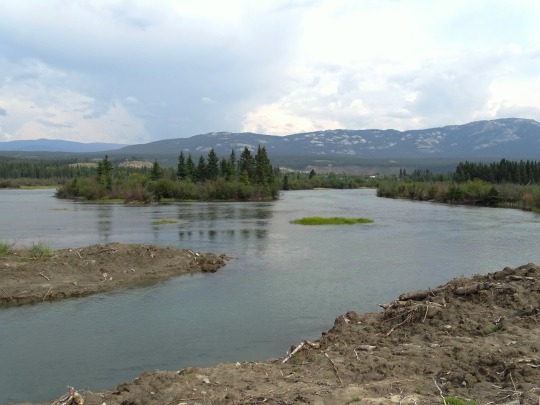
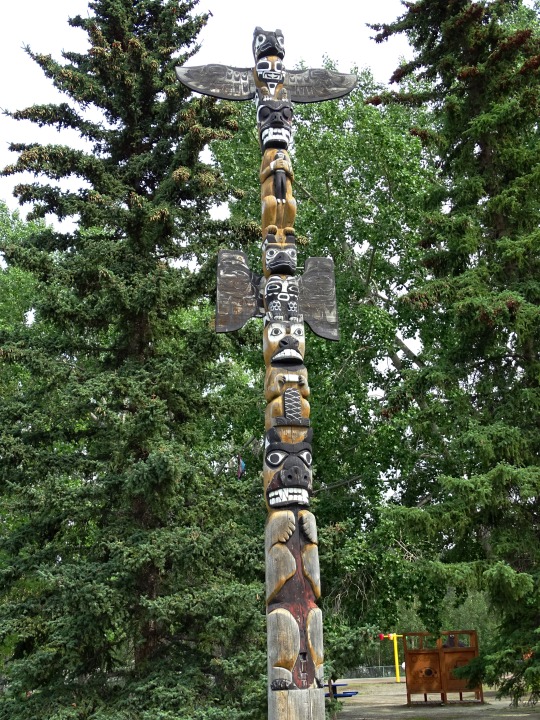








Yukon River, Whitehorse (No. 2)
The name Yukon, or ųųg han, is a contraction of the words in the Gwich'in phrase chųų gąįį han, which means white water river and refers to "the pale colour" of glacial runoff in the Yukon River. The contraction is Ųųg Han, if the /ųų/ remains nasalized, or Yuk Han, if there is no vowel nasalization. In the 1840s, different tribes had different opinions as to the literal meaning of Yukon. In 1843, the Holikachuks had told the Russian-American Company that their name for the river was Yukkhana and that this name meant big river. However, Yukkhana does not literally correspond to a Holikachuk phrase that means big river. Then, two years later, the Gwich'ins told the Hudson's Bay Company that their name for the river was Yukon and that the name meant white water river. White water river in fact corresponds to Gwich'in words that can be shortened to form Yukon. Because the Holikachuks had been trading regularly with both the Gwich’ins and the Yup'iks, the Holikachuks were in a position to borrow the Gwich'in contraction and to conflate its meaning with the meaning of Kuig-pak [River-big], which is the Yup'ik name for the same river. For that reason, the documentary evidence suggests that the Holikachuks had borrowed the contraction Ųųg Han [White Water River] from Gwich'in, and erroneously assumed that this contraction had the same literal meaning as the corresponding Yup'ik name Kuig-pak [River-big].
The Lewes River is the former name of the upper course of the Yukon, from Marsh Lake to the confluence of the Pelly River at Fort Selkirk.
Source: Wikipedia
#Friendship Totem Pole by Stan Peters#Whitehorse#Yukon#travel#original photography#vacation#tourist attraction#landmark#cityscape#landscape#Yukon River#summer 2023#woods#forest#flora#nature#mountains#engineering#the North#fireweed#widlflower#river bank#lake shore#Canada#architecture#Finding Peace Monument by Halain De Repentigny#First Nations#public art#sculpture#Whitehorse Waterfront Trolley
15 notes
·
View notes
Text
at the last stroke of midnight (pt. 2)


Pairing: Shouto Todoroki/Reader
WC: 1,904
Content warnings: aged up characters, everyone is in their 20s or older. fantasy au. no pronouns used for reader, but they are described to wear skirts and are referred to as ‘my lady’. brief descriptions of fantasy violence.
part 1 : part 2 (you are here) : part 3

Your first impression of the tournament is that it is loud. The stands on both sides of the field are crammed with people, and the sound of chatter washes over you like a wave. The queen had made it a point that her box not be above the stands this year, so you are down in the thick of it.
It’s a far cry from the peace of your mountain home, where the loudest noise is the rushing water of the glacial runoff that flows through the center of your village. It’s even quieter in winter- it gets so quiet that you can hear the snow fall.
This is… not that.
Another thing you miss about your home is how cool it is. Even in the summer, the nights get cold enough that an extra blanket or a sweater feels nice. Here you’re sweating under three layers of skirts. Curse these southerners and their damn formal clothing, you think as you try to subtly adjust your skirts to get some semblance of airflow.
You hadn’t been informed that this tournament would require even the servants to be in formal dress, so you’d missed the beginning of the tournament while the other ladies in waiting quickly stuffed you into a gown. You’d almost deliberately left the favor the queen had given you on the vanity in your quarters, but then you remembered the hopeful look on the queen’s face when she’d given it to you, and begrudgingly stuffed it in your pocket.
Unfortunately, since you’d missed the introductions at the beginning of the tournament, you didn’t know any of the knight’s names, and you haven’t been in the south long enough for any of the crests the knights are wearing to mean anything. You watched the ladies around you hand out their favors to knights who came riding up with a bit of interest. Luckily it seemed like they knew the knights who approached them, and blushed and tittered when the knights would tip their lances to them for the ladies to place the favor.
You don’t know any of these knights, and it seems unlikely that any of them will come to you for a favor, so you busy yourself watching the spectacle. You know the queen is going to ask you what you thought about it, so you want to have answers for her interrogation questions later.
It means that your eyes are elsewhere when a knight rides up to you. They have to clear their throat and tap their lance against the railing of the box to draw your attention. You look to either side of you to see who the knight is trying to catch, when the knight speaks.
“I was looking for you,” they say, and their voice sends a shudder up your spine. They lift a hand to their visor, opening it just enough that you can see the mismatched eyes underneath, twinkling with amusement. “You’re hard to find.”
“Well you found me,” you huff, crossing your arms. “Do you want a prize?”
“Yes, actually.” The knight smiles, and tips his lance in your direction. “Would you grant me your favor, my lady?”
“Why should I give it to you?” you ask, looking the knight over for any clue to his identity. His armor is plain, and his shield bears no crest, only a red and white field. Like his hair, your brain supplies.
“I need the luck,” the knight says, his eyes earnest.
“I’m sure there are dozens of ladies here who could give you luck,” you gesture to the stands filled with women, wreaths of flowers clutched in their hands.
“But I want your luck,” he pleads.
“Fine,” you cave, leaning down to slide the wreath of flowers over the tip of his lance. “But if you win, I want the prize. It is my luck, after all.”
He stands up in the stirrups of his saddle, reaching up to grasp your hand in his gauntleted one before you can pull away. “As you wish, my lady,” he murmurs, keeping his eyes on yours as he presses a gentle kiss to your knuckles.
You open your mouth to say something, but the horns ring out, signaling the start of the tournament. The knight smiles at you one last time, before he sits back down in his saddle and shuts the visor of his helmet. He waves at you before turning his horse to ride to the start line.
You pull your hand to your chest, unconsciously rubbing the spot where he kissed. His lips really are as soft as they look, you muse for a moment before snapping yourself out of your daze. You do your best to ignore the pounding of your heart as you watch the knights assemble for the first part of the tournament.
Jousting is the first event. You’ve seen knights practice in the training yards of the castle, trying to knock each other off their horses or gather rings on their lances. It’s much different watching it up close, and you find yourself swept up in the enthusiasm of the crowd, cheering at the clash of lances on steel.
As loath as you are to admit it, the queen was right, you muse as you watch. This is more fun than you were expecting. You groan inwardly at the thought of telling her that. She might have a reputation as being refined and elegant, but she can be smug as hell when she’s right about something.
The knight with the red and white shield is one of the last to go in the jousting event. You watch as he takes his place at the end of the tilting lane, lance in hand. The flowers you gave him flutter in the wind at the base of the lance, and you can feel the queen’s knowing gaze on the back of your head. You stubbornly refuse to turn and look, keeping your eyes fixed on the knight.
The stands quiet as the heralds call the start of the round. The crowd seems to be holding their breath, waiting for the sound of impact. You hear the drum of the horse’s hooves on the dirt as they pound down the tilting lane, and the crowd roars as both lances shatter against the knight’s armor. Both of them stay seated, turning their horses to go back to their starting point and prepare for another pass.
Brushing aside the lance that his squire offers him, your knight clambers off his horse and runs into the tilting lane with a clank of steel. The crowd gasps, watching him root around in the dirt before he finds what he’s looking for- he pulls the favor you gave him out of the dirt and dusts it off, before trotting back to his side of the tilting lane and climbing back up on his horse. You watch as he slides the favor over the tip of his new lance before getting into position. The crowd murmurs around you as the heralds call the start of the next pass.
There’s a clash of wood on steel and you watch as your knight unseats his opponent with a clean hit, the other knight going flying off his horse and landing in the dirt. Your knight reins in his horse and swings down, walking over to offer the other knight a hand up as the squires run down the lanes.
After making sure that his opponent landed safely, your knight turns to the queen’s box and salutes with his lance, as is the victor’s tradition. For a moment, you feel his eyes on you, even though they’re covered by the steel of his helmet’s visor. You dismiss the feeling as nonsense, but you can’t help the slight flush that colors your cheeks.
Once the jousts finish, you watch the tournament attendants clear the tilting lane markers and reset the arena. The victorious knights gather around the edges, talking quietly with their squires as the tournament attendants finish setting up the arena for the melee.
Over the chatter of the festival goers around you, you hear the queen call your name. You leave the railing and turn towards her seat, curtsying as you approach. “Your majesty,” you greet, bowing your head with your curtsy.
“I have a favor to ask you,” she says, inclining her head to you conspiratorially. “Take your handkerchief to that knight with the red and white shield.”
You snap your head up, looking at her incredulously. “What? Why?” You hiss, lowering your voice to not be heard over the crowd.
“You gave him your favor, did you not? Take him your handkerchief to wipe his face, and go congratulate him on his win.”
You want to say no, but she looks so excited that you can’t bring yourself to deny her. “Yes, your majesty,” you say with another curtsy as you turn to leave. As you walk away, you hear Princess Fuyumi, seated next to the queen, start “The knight with the red and white shield? Mother, isn’t that-”
The queen shushes her, and begins to say something that gets lost in the crowd as you make your way out of the box. You see several other ladies walking toward the field as well, each of them approaching one of the knights with water or towels in their hands.
Your knight has his visor up, a cup of water at his lips as he surveys his competition. His eyes catch you approaching, and they brighten as he turns toward you. He waits for you to approach, varicolored eyes watching you as you walk closer.
“I told you I needed the luck,” he gestures to the favor, which he now has pinned to his breastplate.
“Your lance broke on the first hit,” you offer your handkerchief to him, which he accepts gratefully. He dabs at the sweat on his brow, and you’re briefly distracted by how unfair it is that he looks so handsome while sweating. It makes his skin glisten in the summer sun, highlighting his high cheekbones.
With his hair pushed back inside his helmet, you can get a good look at his face, and you notice the scar that surrounds one of his eyes. It makes him look dashing, you decide.
“But I stayed in the saddle,” he reminds you. He goes to return the handkerchief, but his hand halts midair. “May I return this to you after I’ve had a chance to wash it?”
“That would be preferable.”
“I’ll need to know who to return it to,” he looks at you hopefully. “Will you tell me your name?”
“I already told you, I’m no one of consequence,” you sniff, turning your head to survey the arena and crossing your arms over your chest.
“You’re seated in the queen’s box,” he points out. “That makes you of consequence.”
“There are servants in the queen’s box too.”
He starts to ask another question, but the herald’s trumpets interrupt him. Something in his expression makes you pause as you turn to go back to the queen’s box. “Uh, good luck out there,” you offer, smiling at him tentatively.
His answering smile is luminous, before his squire grabs his attention and begins preparing him to enter the arena. You begin the walk back to the queen’s box, turning over the thought in your head that your knight has a very cute dimple.
#todoroki shouto x reader#shouto x reader#todoroki x reader#todoroki x you#todoroki shouto#my hero x reader#my hero academia#kaiawrites
20 notes
·
View notes
Text
Southern Ocean
In 2000, the Southern Ocean is the newest ocean recognized by the International Hydrographic Organization.
It borders Antarctica in its entirety.
In terms of size, it’s the fourth-largest at 20,327,000 square kilometers. It extends out to 60 degrees South latitude.
It’s an extreme environment and is the least understood of the 5 oceans. This is because it is unexplored, far from populated areas, and has a severe climate. Despite the Southern Ocean being unexplored, about 80% of all oceans in the world are unexplored. There’s still a lot of work to do for ocean exploration.
Includes: Amundsen Sea, Bellingshausen Sea, part of the Drake Passage, Ross Sea, a small part of the Scotia Sea, Weddell Sea, and other tributary water bodies
Area
Total Area: 21.96 million sq km
Area - Comparative: Slightly more than twice the size of the US
Coastline: 17,968 km
Climate: Sea temperatures vary from about 10 degrees Celsius to -2 degrees Celsius; cyclonic storms travel eastward around the continent and frequently are intense because of the temperature contrast between ice and open ocean; the ocean area from about latitude 40 south to the Antarctic Circle has the strongest average winds found anywhere on Earth; in winter the ocean freezes outward to 65 degrees south latitude in the Pacific sector and 55 degrees south latitude in the Atlantic sector, lowering surface temperatures well below 0 degrees Celsius; at some coastal points intense persistent drainage winds from the interior keep the shoreline ice-free throughout the winter
Ocean Volume: 71.8 million cu km
Percent of World Ocean Total Volume: 5.4%
--------------------------------------------------------------------------
Bathymetry
Continental Shelf: A rather flat area of the sea floor adjacent to the coast that gradually slopes down from the shore to water depths of about 200 m (660 ft). Dimensions can vary: they may be narrow or nearly nonexistent in some places or extend for hundreds of miles in others. The waters along the continental shelf are usually productive in both plant and animal life, both from sunlight and nutrients from ocean upwelling and terrestrial runoff. Compared to the continental shelf found in other oceans, in Antarctica the continental shelf is narrower and much deeper. In addition, the continental shelf has been deeply scoured by glacial action.
Astrid Ridge
Belgrano Bank
Gunnerus Ridge
Hayes Bank
Iselin Bank
Continental Slope: Where the ocean bottom drops off more rapidly until it meets the deep-sea floor (abyssal plain) at about 3,200 m (10,500 ft) water depth. The deep waters of the continental slope are characterized by cold temperatures, low light conditions, and very high pressures. Sunlight does not penetrate to these depths, having been absorbed or reflected in the water above. The continental slope can be indented by submarine canyons, often associated with the outflow of major rivers. In the case of Antarctica, the continental slope has been scoured by glacial action cutting troughs and canyons down the slope. Another feature of the continental slope are alluvial fans or cones of sediments carried downstream to the ocean by major rivers and deposited down the slope.
Southern Ocean
Amery Basin
Filchner Trough
Hillary Canyon
Pobeda Canyon
Abyssal Plains: At depths of over 3,000 m (10,000 ft) and covering 70% of the ocean floor, are the largest habitat on earth. Sunlight does not penetrate to the sea floor, making these deep, dark ecosystems less productive than those along the continental shelf. Despite their name, these “plains” are not uniformly flat; they are interrupted by features like hills, valleys, and seamounts.
Amundsen (Abyssal) Plain
Enderby (Abyssal) Plain
South Indian/Australian-Antarctic Basin
Southeast Pacific/Bellinghausen Basin
Weddell (Abyssal) Plain
Mid-Ocean Ridge: Rising up from the abyssal plain, is an underwater mountain range, over 64,000 km (40,000 mi) long, rising to an average depth of 2,400 m (8,000 ft). Mid-ocean ridges form at divergent plate boundaries where two tectonic plates are moving apart and new crust is created by magma pushing up from the mantle. Tracing their way around the global ocean, this system of underwater volcanoes forms the longest mountain range on Earth. Fracture Zones are linear transform faults that develop perpendicular to the line of the mid-ocean ridge which can offset the ridge line and divide it into segments.
Pacific-Antarctic Ridge
Undersea Terrain Features: The Abyssal Plain is commonly interrupted by a variety of commonly named undersea terrain features including seamounts, guyots, ridges, and plateaus. Seamounts are submarine mountains at least 1,000 m (3,300 ft) high formed from individual volcanoes on the ocean floor. They are distinct from the plate-boundary volcanic system of the mid-ocean ridges, because seamounts tend to be circular or conical. A circular collapse caldera is often centered at the summit, evidence of a magma chamber within the volcano. Flat topped seamounts are known as guyots. Long chains of seamounts are often fed by "hot spots" in the deep mantle. These hot spots are associated with stationary plumes of molten rock rising from deep within the Earth's mantle. These hot spot plumes melt through the overlying tectonic plate as it moves and supplies magma to the active volcanic island at the end of the chain of volcanic islands and seamounts. An undersea ridge is an elongated elevation of varying complexity and size, generally having steep sides. An undersea plateau is a large, relatively flat elevation that is higher than the surrounding relief with one or more relatively steep sides. Although submerged, these features can reach close to sea level.
Akopov Seamounts
De Gerlache Seamounts
Endurance Ridge
Marie Byrd Seamount
Maud Rise
Scott Seamounts
Ocean Trenches: The deepest parts of the ocean floor and are created by the process of subduction. Trenches form along convergent boundaries where tectonic plates are moving toward each other, and one plate sinks (is subducted) under another. The location where the sinking of a plate occurs is called a subduction zone. Subduction can occur when oceanic crust collides with and sinks under (subducts) continental crust resulting in volcanic, seismic, and mountain-building processes. Subduction can also occur in the convergence of two oceanic plates where one will sink under the other and in the process create a deep ocean trench. Subduction processes in oceanic-oceanic plate convergence also result in the formation of volcanoes. Over millions of years, the erupted lava and volcanic debris pile up on the ocean floor until a submarine volcano rises above sea level to form a volcanic island. Such volcanoes are typically strung out in chains called island arcs. As the name implies, volcanic island arcs, which closely parallel the trenches, are generally curved.
South Sandwich Trench; the deepest location in the Southern Ocean
Atolls: Due to the extremely cold water there are no atolls in the Southern Ocean
--------------------------------------------------------------------------
Highest Point: Sea Level
Lowest Point: Southern end of the South Sandwich Trench -7,434 m unnamed deep
Mean Depth: -3,270 m
Ocean Zones: Composed of water and in a fluid state, the ocean is delimited differently than the solid continents. The ocean is divided into three zones based on depth and light level. Although some sea creatures depend on light to live, others can do without it. Sunlight entering the water may travel about 1,000 m into the oceans under the right conditions, but there is rarely any significant light beyond 200 m.
The upper 200 m (656 ft) of the ocean is called the euphotic, or "sunlight," zone. This zone contains the vast majority of commercial fisheries and is home to many protected marine mammals and sea turtles. Only a small amount of light penetrates beyond this depth.
The zone between 200 m (656 ft) and 1,000 m (3,280 ft) is usually referred to as the "twilight" zone, but is officially the dysphotic zone. In this zone, the intensity of light rapidly dissipates as depth increases. Such a minuscule amount of light penetrates beyond a depth of 200 m that photosynthesis is no longer possible.
The aphotic, or "midnight," zone exists in depths below 1,000 m (3,280 ft). Sunlight does not penetrate to these depths and the zone is bathed in darkness.
--------------------------------------------------------------------------
Natural Resources: Probable large oil and gas fields on the continental margin; manganese nodules, possible placer deposits, sand and gravel, fresh water as icebergs; squid, whales, and seals - none exploited; krill, fish
Natural Hazards: Huge icebergs with drafts up to several hundred meters; smaller bergs and iceberg fragments; sea ice (generally 0.5 to 1 m thick) with sometimes dynamic short-term variations and with large annual and interannual variations; deep continental shelf floored by glacial deposits varying widely over short distances; high winds and large waves much of the year; ship icing, especially May-October; most of region is remote from sources of search and rescue
Geography - Note: The major chokepoint is the Drake Passage between South America and Antarctica; the Polar Front (Antarctic Convergence) is the best natural definition of the northern extent of the Southern Ocean; it is a distinct region at the middle of the Antarctic Circumpolar Current that separates the cold polar surface waters to the south from the warmer waters to the north; the Front and the Current extend entirely around Antarctica, reaching south of 60 degrees south near New Zealand and near 48 degrees south in the far South Atlantic coinciding with the path of the maximum westerly winds
--------------------------------------------------------------------------
Enviornment
Enviornment - Current Issues: Changes to the ocean's physical, chemical, and biological systems have taken place because of climate change, ocean acidification, and commercial exploitation
Enviornment - International Agreements: The Southern Ocean is subject to all international agreements regarding the world's oceans; in addition, it is subject to these agreements specific to the Antarctic region: International Whaling Commission (prohibits commercial whaling south of 40 degrees south [south of 60 degrees south between 50 degrees and 130 degrees west]); Convention on the Conservation of Antarctic Seals (limits sealing); Convention on the Conservation of Antarctic Marine Living Resources (regulates fishing) note: mineral exploitation except for scientific research is banned by the Environmental Protocol to the Antarctic Treaty; additionally, many nations (including the US) prohibit mineral resource exploration and exploitation south of the fluctuating Polar Front (Antarctic Convergence), which is in the middle of the Antarctic Circumpolar Current and serves as the dividing line between the cold polar surface waters to the south and the warmer waters to the north
Climate: Sea temperatures vary from about 10 degrees Celsius to -2 degrees Celsius; cyclonic storms travel eastward around the continent and frequently are intense because of the temperature contrast between ice and open ocean; the ocean area from about latitude 40 south to the Antarctic Circle has the strongest average winds found anywhere on Earth; in winter the ocean freezes outward to 65 degrees south latitude in the Pacific sector and 55 degrees south latitude in the Atlantic sector, lowering surface temperatures well below 0 degrees Celsius; at some coastal points intense persistent drainage winds from the interior keep the shoreline ice-free throughout the winter
--------------------------------------------------------------------------
Ports and Terminals
Major Seaport(s): McMurdo, Palmer, and offshore anchorages in Antarctica
Note: Few ports or harbors exist on the southern side of the Southern Ocean; ice conditions limit use of most to short periods in midsummer; even then some cannot be entered without icebreaker escort; most Antarctic ports are operated by government research stations and, except in an emergency, are not open to commercial or private vessels
5 notes
·
View notes
Photo

Pakistan ravaged by climate change
The accumulation of increasingly violent phenomena threatens the population, already weakened by the government's lack of management and prevention.
by @Victor_Simonnet
Unprecedented heat waves from March to June
During this period, both Pakistan and northwestern India record temperatures of 6°C to 9°C above seasonal norms, according to the Pakistan Meteorological Service.
Jhelum, 47°C on April 14
Jacobabad, 51°C on May 14
Nawabshah, 50.5°C on May 14
In 2022 the monsoon started in June, earlier than expected. July 2022 was the wettest month in over sixty years (1961).
The Indus River, the backbone of the country, is both a communication route and a source of drinking and irrigation water for agriculture. Pakistan depends on this strategic river, already weakened by the developments carried out by India upstream.
The province of Balochistan, usually spared by the monsoon, has recorded rainfall five times higher than average since July.
The province of Sind provides a quarter of the country's agricultural production. The spring drought caused the wheat harvest to drop by 20%. More than 1 million hectares of crops were flooded.
With more than 200 million inhabitants and a population growth rate of 2.4% per year, urbanization is accelerating. Towns sometimes develop in flood-prone areas, rivers are modified and their approaches are concreted. The artificialization of the soil reinforces the phenomenon of runoff.
Pakistan is particularly vulnerable to flooding. In 2010 these had caused the death of 2,000 people and caused damage close to 40 billion dollars. Since then, these violent phenomena have become more frequent.
As temperatures rise, glaciers are melting and feeding the flow of rivers. High altitude glacial lakes fracture and suddenly release huge amounts of water. Thirty lakes threaten more than 7 million people.
The cold equivalent of the El Nino phenomenon causes a cooling of part of the surface waters of the Pacific, influencing the cycle of precipitation and the climate of certain regions of the globe. While its usual duration is two years, La Nina conditions persist for the third year in a row.
Le Monde, September 3, 2022
67 notes
·
View notes
Photo
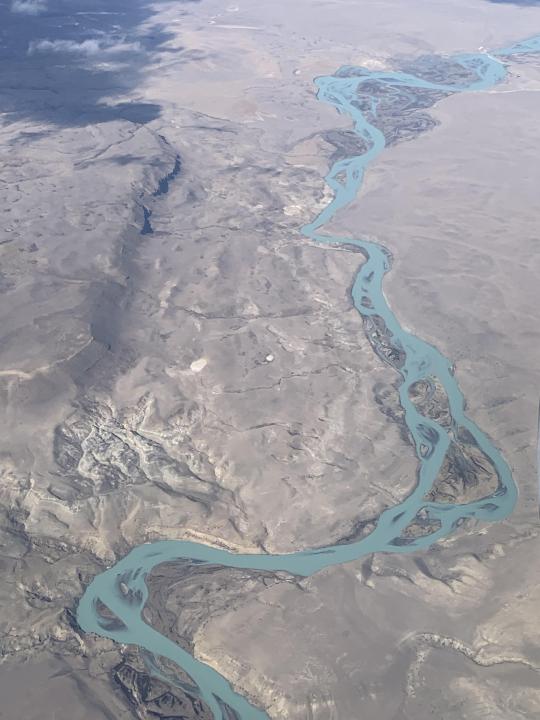
The turquoise-blue waters of the Río La Leona in Patagonia, Argentina, carrying the glacial runoff from the Viedma Glacier. Taken from an airplane, sorry for the potato quality. [OC][3024 x 4032]
16 notes
·
View notes
Note
OCs? 👀👀
A pair of them, from that little original ficlet I did!
They're best friends from the same city. They both grew up in or around a lighthouse that also served as a temple to various sea gods.
One of them is a brilliant golden child who is skilled at everything he does from swordplay to theology to baking. Flawless. Amazing. Beautiful. Genuinely great guy. Relative of some of the more influential priests at the lighthouse temple. As far as anyone is concerned, his only major personality flaw is his taste in friends. Has been at the figurative eye of the storm for every major disaster to hit the city since he was a toddler. Nothing really bad ever happens to him. The people around him, though? They aren't so lucky.
For the other character, it's hard to tell if he has bad luck or good luck, because even though he gets into awful situations constantly, he also always survives them. Barely. Sometimes by finding himself in a worse situation. He has thus far managed to avoid having a boat sink on him, but he actively decided to learn how to swim despite all the local rivers being fed by glacial runoff. Isn't entirely sure what his face looks like because he always has either bruises, massive nasty acne, rashes, mud, substances worse than mud, or swelling of unclear origin on it. His family was one of the temple's charity cases.
Despite no one being able to detect any actual curses acting on either of them, they're sent on a 'quest' (read: kicked out of town) after one shenanigan too many.
58 notes
·
View notes
Text


Sampling glacial runoff. The fine particles of crushed rock absorb and scatter sunlight, making the water appear vibrantly blue
62 notes
·
View notes
Text
Here’s a little something for the Celestial Harmonies au, in reference to a previous one-shot I wrote for it where Crowley and Aziraphale got drunk and Crowley said some stuff.
For those of you not familiar, this is the au where Crowley works at a national park in the states that is guarded by an eldritch angel Aziraphale who pretends to be a mountain man/lumberjack that Crowley has a crush on.
On with the fic!
--
Aziraphale insisted on them taking a stroll through the woods, along a common path that the tourists and locals frequent. It was a beautiful day and Crowley was always happy to get out of doing his actual job, so he was fine to go for a small walk with Aziraphale.
Especially since the older man was holding his hand as they walked down the trail and Crowley was still trying to process this fact.
“Oh, you’ll love it.” Aziraphale spoke. “It’s not always easy to spot, but if you know where it is, then you know. Of course, I obviously know where it is, and now you will!”
“W-what?” Crowley blinked, his brain registering that the man was speaking to him.
“The lovely little waterfall I was just telling you about.” Aziraphale smiled, chuckling softly. “Did you not hear me?”
“I... was, uh, I mean...” He glanced at their hands and Aziraphale’s smile softened. “It’s so weird, knowing that we’re dating now.”
“Yes, but isn’t it also nice, dear?”
“Very.” Crowley swallowed, his face felt warm.
They continued along, with Aziraphale pointing out birds in the trees, and Crowley spotting flowers and plants he recognized, until they came across a small spot in the path where Aziraphale broke off from, taking him further into the trees.
It was darker here, cooler, and more quiet. It sent a shudder up Crowley’s spine, he still wasn’t sure how he felt about the deeper areas of the forests of the park, considering his encounter with The Angel. But he was with Aziraphale, and the man always made him feel so safe, protected. He gave Aziraphale’s surprisingly soft hand a squeeze as they walked.
Soon, he heard the sounds of water and they walked a bit further until they found a small stream. Walking along that led to a ledge in the ground and there it was, the waterfall, pouring into a crystal clear pool of water.
“How the hell did ya find somethin’ like this?” Crowley asked, impressed. It was lovely, and the plants growing around the pool were so bright and vibrant, thriving in such an area where even the sun seemed to be shining on it perfectly. It was like something from a movie or a book.
“Oh, when you’ve been here as long as I have, you tend to find little secrets about.” Aziraphale smiled as he sat on the ledge. Crowley did the same, close to the stream as it ran off into the pool. He reached out with his free hand, touching the water, only to pull it back. “Ach! Colder than a witch’s tit! Damn!”
Aziraphale laughed at this. “It’s from the mountains, glacial runoff, some of the lakes, rivers, and streams get their water from it. Hence why you need to be careful around those waters, the coldness can send you into shock.
He was still smiling, almost knowingly. “That was rather cute, you know.”
“What was?” Crowley asked, wiping his hand on his shirt.
“Your accent slipping out like that.”
Crowley tensed for a moment. “W-what accent? You mean mah southern drawl?”
“Oh please, dear boy, I meant your Scottish one. I’ve heard it before, when you shocked yourself repairing that light fixture and you were cursing up a storm. Oh, and when you got drunk at my place, you ended up carrying a conversation with me with it.”
“I...” Crowley hadn’t known this, and he felt embarrassed. “W-well, it comes with havin’ lived there for a good chunk of my life.”
“I thought you lived in the southern United States.”
“I mean, yeah, I do live there, and I was born there, in DC to be in fact, but when...” He coughed, might as well just let it out. “When Mum and Dad split when I was a kid, Mum took me with her back home to Scotland to live with her and aunty Ashtoreth, and I picked up on the accent there, but I still had the southern one I got from Dad’s family. It switches, often depending where I live.”
“That’s rather cute.”
“How so?”
“That you slip in and out of it so easily. I used to do that when I lived in the United Kingdom.”
Crowley snorted. “You sound like you’re from London. Can you do other local accents.”
“Mmmm, sometimes, depends, I’m pretty good with impressions.” Aziraphale grinned. “Do you think I am, dear?” He asked as he leaned in close, and Crowley realized that Aziraphale sounded like him.
“Oi! What the fuck, that was so weird!” He exclaimed, then laughed. “How the hell did ya do that?”
“I’ve been around a long time, Crowley, you pick up skills.”
“Clearly not all the skills you’ve picked up you’ve mastered like that.”
“Whatever do you mean?”
“I’ve seen you try to perform magic tricks, angel.” Crowley smirked. “You’re terrible at them!”
Aziraphale looked offended at this. “How dare-! I’ll have you know I’m an expert! I even studied the best books on the matter! I’ve trained with one of the best in London!”
“Oh, I’m sure.” Crowley snickered and Aziraphale gave him a small shove, making Crowley tilt, his arm catching him but falling into the stream. He yelped at the icy coldness and Aziraphale laughed at this. “Do that again and you’re gonna take a dip in the pool!”
“Oh, you’d never do that to me.” Aziraphale laughed still, pulling him close, peppering his face with kisses as he rubbed his hand over Crowley’s wet arm. Crowley squirmed and laughed at the affection and attention, barely registering how his arm felt dry and warm again, in just a matter of seconds, as if nothing had happened just a moment ago.
--
Crowley has two accents, this one southern belle one that David can do (and it reminds me of Blanche from Golden Girls), and David’s normal accent. This was inspired by a friend from my childhood who has a German mother and an American father and could slip between accents so easily, it was pretty impressive.
Aziraphale can do impersonations, just like Michael can, but he can also do perfect mimicry if he needs to. Sometimes an angel needs to do that, for angel reasons.
#celestial harmonies national park au#good omens#ineffable husbands#crowley#anthony j crowley#aziraphale#john's drabbles
11 notes
·
View notes
Text
The SIX MATERIAL QUARTERMASTERS (counted as seven or eight by some), often mischaracterized as gods or some human-derived spirit, are in fact simply the most prominent members of a parasitic species. They hail from an adjacent manifold that contains Substance but no Form, and must derive sustenance by extending their multitudinous body into our space and tricking some human into bestowing shape upon it, which they can then consume as entropy weathers the object.
WORM-RIDDEN GRANDMOTHER WOOD is the oldest of them. Though those who only know her name might expect a crooked knot of wood, she is in fact tall and thin, with piercing green eyes and narrow, long fingers, in imitation of those hafts and beams that humanity fashions wood into. Her legs end in small, splintery stumps, crisscrossed by the tunnels of small burrowing things (after all, even parasites have parasites of their own), and so she must be held upright by another of her family (a fact which she resents greatly).
GLACIAL MAUSOLEUM PATRIARCH is slow to change and slower to hate. His appearance is that of a massive mountain, ziggurat, or gravestone, into which a face has been crudely hewn. His voice is the rumble of avalanches and the crunch of gravel. For three million years he was honored above all, and so recently did this change that he still forgets it from time to time. To him, mankind's obsession with oil and metal is but a fancy, and until it passes he will happily let himself be fashioned into roads, walls, and other crude forms.
Weakest of their numbers is the ALLOYED SUN-GREEN MONARCH, the dented, tarnished lord of impure things, of brass and bronze and solder, of fires that burn with colored smoke and streams polluted by runoff, of magic as people understood it in ancient times. It was he who told humanity that the powerful should bear regalia, and that lesser men should labor to fashion those. He was overthrown by his younger brother, who railed against his cruelty, only to become a worse tyrant still after taking the throne for himself.
The RUSTED APOTHEOSIS HERO appears as a fit young man with an ancient, wrinkled face, bearing a broken blade and jammed gun. He is the glory and folly of battle, the smith and swordsman and gravedigger, of all his brethren the only to understand humanity, and all the sadder for it. Not too long ago, he was the most powerful of their number, but after a great war nearly tore Earth apart, he chose to become what he is today.
Greatest of the Quartermasters (for now) is the POLYMERIC CHRONOPHAGE. Once she was a volatile sea of sludge, slumbering beneath the earth, but she called humans to her and tricked them into burning away the potential that her past form brimmed with. Now, she can be found in glossy, smooth things, almost inviolable, for she consumed their future potential in the process of their creation, cursing them to unchanging permanency. A description of her would serve no purpose, for she delights in discarding and replacing fragments of herself.
SPARKWEAVING SILICON ONEIROMANCER, youngest and strangest of the Quartermasters, exists in infinite exact and miniscule shapes, which in their mysterious arrangements can conjure Form from nothingness. She is a quiet, solitary being, preferring to mull over her own thoughts in peace. It is said that she knows of a realm beyond ours, which lacks matter as hers lacks form, and would nothing rather than wholly destroy the veil that separates it from us. May she never succeed.
6 notes
·
View notes
Photo

Runoff from the northern Baffin Island ice cap cuts through a glacial moraine to enter Walker Arm of Sam Ford Fjord, Nunavut, Canada.
2 notes
·
View notes
Photo
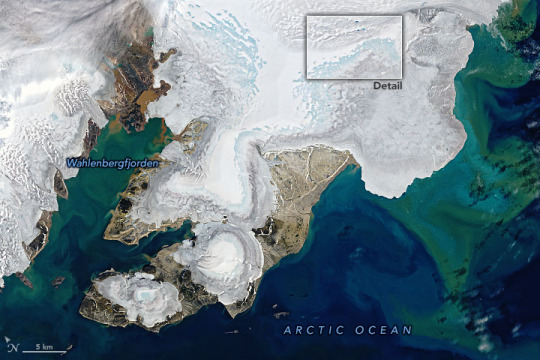
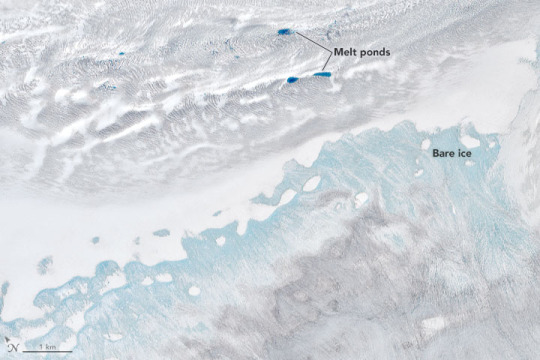
Summer Melting in Svalbard Exceptionally warm air temperatures in summer 2022 have caused record melting across Svalbard. The abundant meltwater, much of which flowed to the ocean, is the latest expression of a rapidly warming climate in Norway’s ice-covered archipelago. According to Xavier Fettweis, a climatologist at the University of Liège, the cumulative melting across Svalbard between June 1 and July 31, 2022, was 1.5 times larger than the previous record in 2018. Since the start of summer, he noted, about 40 gigatons (44 billion U.S. tons) of meltwater has poured into the ocean. “The melt anomaly is 3.5 times larger than the 1981–2010 average, and 5 times the interannual variability,” Fettweis said. “Only a changing climate can explain this.” Located halfway between Norway’s mainland and the North Pole, Svalbard is one of the fastest warming places on the planet. More than half of its land area is covered with ice, representing about 6 percent of planet’s glaciated area outside of Greenland and Antarctica. Even before the record melting, warming was already changing the landscape. Glaciers have been retreating, and a surface layer of compressed porous snow, known as “firn,” has been losing its capacity to store much meltwater. The excessive warmth in summer 2022 has taken a visible toll. These natural-color images, acquired on July 29, 2022, by the Operational Land Imager-2 (OLI-2) on Landsat 9, show a portion of Nordaustlandet—a major island in northeast Svalbard. Notice the extensive light-blue areas where snow and firn have melted away and exposed bare ice. The detailed image (below) shows several dark-blue melt ponds, where meltwater has pooled on the surface of the ice cap. Offshore, some of the colorful water is likely due to sediments that were eroded by the flow of ice over bedrock, and then carried by meltwater into the waters of Wahlenbergfjorden and the adjacent Arctic Ocean. There might also be phytoplankton present, which can color the water turquoise-blue and green. The melting this summer was caused by persistent warm winds blowing from the south. From May 1 through July 25, 2022, parts of the archipelago saw air temperatures that averaged up to 1.8°C (3.2°F) higher than usual. A significant pulse of warm air starting on July 15 produced Svalbard’s highest recorded melt volume on July 17. Other factors also contributed to the record melting, Fettweis explained. First, sea ice retreated from the archipelago earlier than usual, exposing open ocean water by the end of spring 2022. (Sea ice can sometimes persist into late summer). This allowed warm southerly winds to reach land without first being chilled by blowing over sea ice. Also, little snow fell during the 2021–2022 winter. The thin layer of fresh snow quickly melted as temperatures warmed, exposing large swaths of darker, older snow, firn, and bare ice. Compared with bright, new snow, these darker surfaces absorb more energy from the Sun, which amplifies melting during the Arctic’s long sunlit days. In the past, much of the meltwater would have been stored within the layer of firn, where the water eventually refreezes. The process helps prevent meltwater from flowing into the ocean and can help preserve glacial ice. According to Fettweis, between 1981–2010, Svalbard’s snowpack retained about 34 percent of the summer meltwater. This summer, he said, only 8 percent was retained. Over the past decade, mass losses from melting and runoff have outpaced accumulations from rain and snow. “Svalbard is now losing more ice than it is gaining,” Fettweis said, “and it is clear that this trend will continue in the future.” NASA Earth Observatory images by Joshua Stevens, using Landsat data from the U.S. Geological Survey. Story by Kathryn Hansen with science review by Xavier Fettweis/U. Liège, and Christopher Shuman/NASA/UMBC.
2 notes
·
View notes
Text

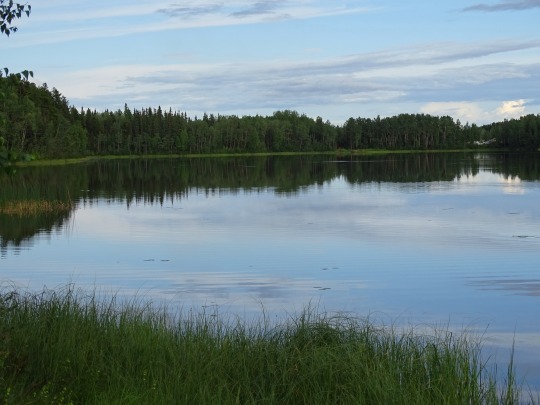





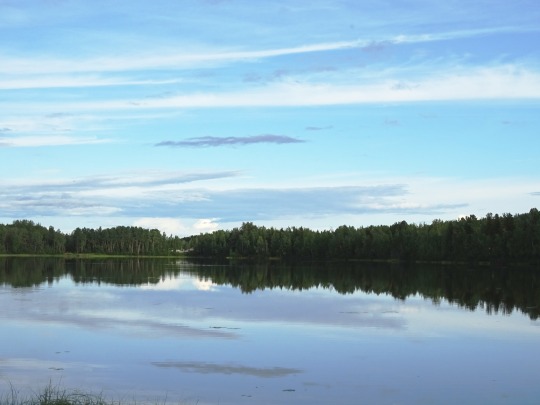

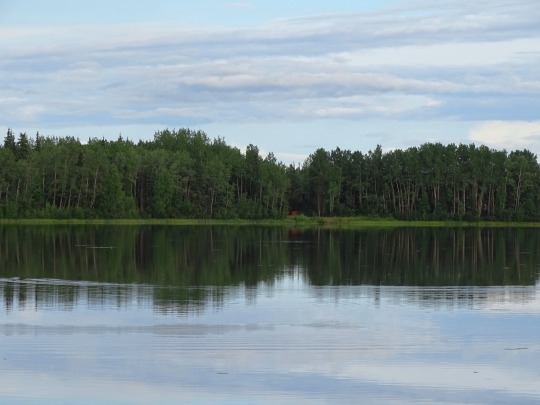
Wye Lake, YT (No. 2)
The territory is named after the Yukon River, the longest river in Yukon. The name itself is from a contraction of the words in the Gwich'in phrase chųų gąįį han, which means "white water river" and refers to "the pale colour" of glacial runoff in the Yukon River.
Historically, the name of the Yukon Territory has been abbreviated to "The Yukon" in informal speech. In 2003, the territorial government announced that the territory should be referred to as "Yukon", but the change in name sparked discussion amongst Yukoners. In the 2021 election, the leader of the Yukon NDP, Kate White, campaigned on returning to using "The Yukon". Following the election, the Yukon Party government announced that "The Yukon" would again be used by the government.
Source: Wikipedia
#Wye Lake#Watson Lake#Yukon#travel#original photography#vacation#tourist attraction#landmark#cityscape#Canada#summer 2023#the North#small town#Alaska Highway#road trip#lake shore#calm waters#reflection#blue sky#clouds#landscape#countryside#architecture
5 notes
·
View notes
Text
KoThe feel of Lock and Key going on lockdown was cold static across Notha's skin. Familiar and alien. Claustrophobic as the outside world closed off.
She should be protesting, resisting, arguining with them for trapping them. She should answer Remmy. Give him the much needed relief of context.
All she could do was hug him. He'd nearly bowled her over in his rush to her, he was the thing keeping her upright at the moment, not her own legs.
But his hands were cupping her face almost to the point it made her neck hurt. His forehead was pressed to hers, and it was only him and her in the whole world. Nothing else mattered for a minute.
Then his fingers slid up under the edge of her goggles, breaking the seal to her skin.
Panicked, she grabbed his wrist. He was stronger than her, she was never going to be able to stop him and she knew it.
The goggles were off and hanging loosely around his wrist. They kept ending up there.
Her eyes flickered back up to his face, blue-green eyes like where glacial runoff met the sea. Panic, fear, Hope. She wanted this to work. She wanted him to see her.
Her nails dug into his shoulder drawing pinpricks of blood. Was she trying to stop or encourage him? It didn't matter.
They only had to wait a week and she barely made it a handful of days. I'm here. I'm right here. Look at me. Love me please.
Then he was pulling the mask off the bottom of her face.
For a brief moment they looked at one another. Saw one another. She felt happiness well in her chest in the same breath as grief.
Then it was like someone had punched her straight to the solar plexus and everything went dark.the light faded, her expression showing confusion for one brief moment as her body went limp and her hands slid off him, dangling uselessly at her sides.
Lock: We have a problem. Notha Ly'Ehr's vitals have ceased.
(death cw, dormant!, justanothalyehr, @remthalas, it's not letting me tag on mobile)
2 notes
·
View notes